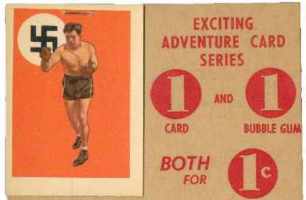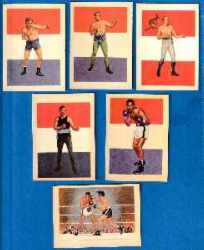1929 'Wer nennt die Lander' CHINA Flag cards - SET (6+1)
The 6-card set of China Flags. From Germany. Imcludes a special 'Lotsen' (Pilot) Flag card.

Please wander around the website for more info, prices, values & images
on vintage baseball, football, basketball, hockey, sport and non-sports cards.
1962 Topps Baseball Cards |

1965 Philadelphia Football |

1956 Adventure cards |

Starting approximately in 1886, sportscards, mostly baseball cards, were often included with tobacco products, for promotional purposes and also because the card reinforced the packaging and protected cigarettes from damage. These sports cards are referred to as tobacco cards in the baseball card hobby. Over the next few years many different companies produced baseball cards. Tobacco cards soon started to disappear as the American Tobacco Company tried to develop a monopoly by buying out other companies.
They were reintroduced in the 1900s, as American Tobacco came under pressure from antitrust action and Turkish competition. The most famous and most expensive, baseball card is the rare T206 Honus Wagner. The card exists in very limited quantities compared to others of its type because Wagner forced the card to be removed from printing. It is widely (and incorrectly) believed that Wagner did so because he refused to promote tobacco, but the true explanation lies in a dispute over compensation.
Soon other companies also began producing baseball and football cards. Sports magazines such as The Sporting News were early entries to the market. Candy manufacturers soon joined the fray and reflected a shift toward a younger target audience for cards. Caramel companies were particularly active and baseball cards were one of the first prizes to be included in Cracker Jacks. World War I soon suppressed baseball card production.
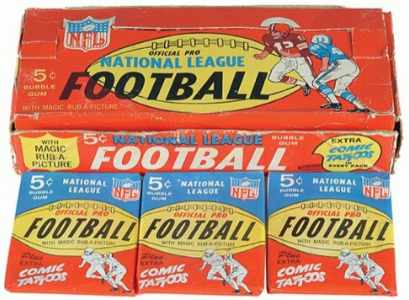 1965 was the 2nd year for Philadelphia Gum creating football cards.
Once again, their set had (198) cards, (14) from each team, featuring the rookie cards of
Hall-of-Famers Paul Warfield, Mel Renfro, Dick LeBeau, Carl Eller, Paul Krause and Charley Taylor.
1965 Philadelphia cards came in a variety of packages: nickel wax packs, ten-cent cello packs and 29-cent rack packs.
1965 was the 2nd year for Philadelphia Gum creating football cards.
Once again, their set had (198) cards, (14) from each team, featuring the rookie cards of
Hall-of-Famers Paul Warfield, Mel Renfro, Dick LeBeau, Carl Eller, Paul Krause and Charley Taylor.
1965 Philadelphia cards came in a variety of packages: nickel wax packs, ten-cent cello packs and 29-cent rack packs.
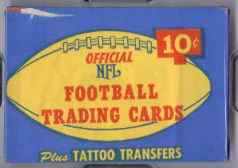 Making this set a bit special was that for the first time in football card history, the NFL logo appeared on the front
of a card. The logo was Philadelphia Gum Company's way of sticking it to Topps as Philadelphia had the exclusive
to produce NFL cards while Topps was left to printing cards of the then 'lesser' AFL teams and players.
Making this set a bit special was that for the first time in football card history, the NFL logo appeared on the front
of a card. The logo was Philadelphia Gum Company's way of sticking it to Topps as Philadelphia had the exclusive
to produce NFL cards while Topps was left to printing cards of the then 'lesser' AFL teams and players.
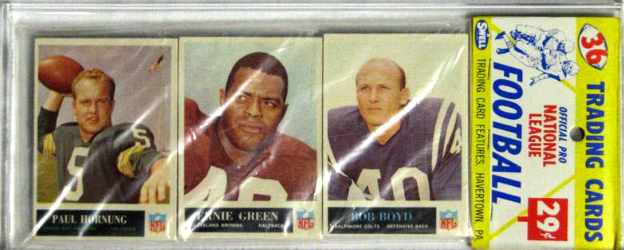
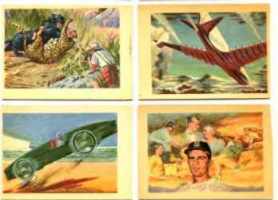 Issued by Gum Products Inc., this 100-card set
covered a variety of subjects. Featuring mostly non-sport like
military or wild life, it also had a few sports related cards.
The most famous being Max Schmeling's card, removed very early from
the set for featuring the Nazi symbol, making it by far the
scarcest and most expensive in the set.
Issued by Gum Products Inc., this 100-card set
covered a variety of subjects. Featuring mostly non-sport like
military or wild life, it also had a few sports related cards.
The most famous being Max Schmeling's card, removed very early from
the set for featuring the Nazi symbol, making it by far the
scarcest and most expensive in the set. 